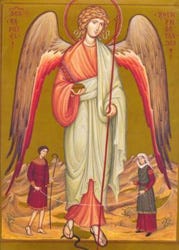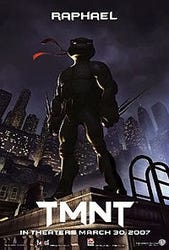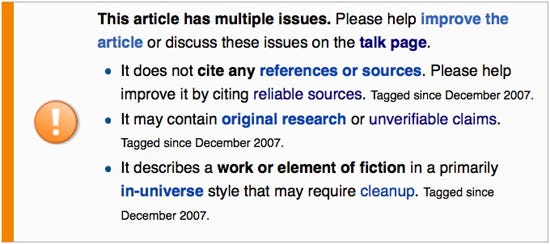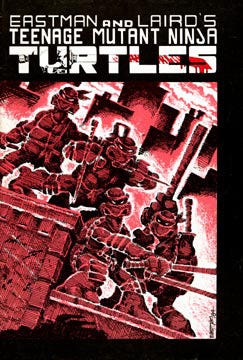The Archangel, the Renaissance Master and the Ninja Turtle



Back in March I considered the subject of "wikigroaning"—a joke / criticism about Wikipedia popularized on the Something Awful Internet forum in 2007. The idea is this: Sometimes, Wikipedia articles on weighty subjects are shorter and less well-developed than articles about similar, less-weighty subjects. What I found was that this critique no longer applied to a comparison of "Lightsaber combat" vs. "Modern warfare"; the former entry no longer strictly exists, as the page now redirects to the larger topic of "Lightsaber" while the latter is essentially a hub for accessing articles on various sub-topics (assymetric warfare, biological warfare, etc.). Today, let's look at another one suggested by Something Awful members: Raphael (archangel) vs. Raphael (ninja turtle). How do the two compare? Superficially, the joke is on Wikipedia: the main text of the article about the comic book character is approximately 3,000 words long, whereas the one about the Judeo-Christian figure is about 1,350. But here's the thing—the TMNT-related article is basically devoid of any citations, and was clearly written by fans of the various comic books, TV shows and movies in which he appears. One might assume that the details should be relatively accurate, as it doesn't seem to be a contentious subject, but who is to say? One citation is provided for the entire article, and indeed the article has been tagged as needing citations since December 2007:

That's almost two years in which fans have been stopping by to work on the article, but no one has yet bothered to clean up problems identified by a non-fan editor, nor have they bothered to provide citations to verify any of it. From this we can infer that most editors on this particular article are focused on this particular topic and are not involved with Wikipedia otherwise. Meanwhile there is another problem with this article. While much of it summarizes discrete events that occur in the TMNT series, other sections read as commentary on / interpretations of the character. For example:
He has an extremely loyal side and is the first to react when another of his brothers is in trouble. This happens on numerous occasions, like when he stops a blow from hitting Donatello using only his sais or kicks the Shredder away from Leonardo when the latter is about to attack.
So one could certainly verify the existence of a particular scene by citing directly from the comics. Yet the interpretation of Raphael's actions is left to the reader, and adding this information directly to Wikipedia is a clear-cut case of original research—expressly forbidden by Wikipedia guidelines. What is one to do if there is no published commentary on this aspect of the character's personality? Is it then to be left out of Wikipedia entirely? In theory, yes. In practice, no. I could remove this section immediately and much more of the article if it so pleased me. But you know what? I won't do it. The article isn't hurting anyone, so in that way its relative frivolity helps. Moreover, it's entirely possible that many or most of these interpretations could be found in published reviews, and without having done this I'm disinclined to delete someone's sincere work, however inexpert. As a known issue, Wikipedia has an informal term for this type of material: fancruft. Fancruft is often deleted, but this much is so far not offensive enough to merit outright deletion.

And how about the archangel? For an article about a Biblical figure I am surprised that it is not better. Only seven citations have been provided, and sections including "Raphael in Islam" and "Raphael in Paradise Lost" have none whatsoever. The quality of the writing is likewise uneven. Clearly, different sections within the article are substantially the work of different editors, and I would probably base my trust in each section according to the quality of the prose. Unsurprisingly, the better-written sections are also the ones with more sources. But let's now finally address the obvious: Something Awful seems to have made a mistake, because the Raphael the turtle is not named for Raphael the archangel. He is named for the Renaissance artist, just like his ninja turtle brothers Leonardo, Michaelangelo and Donatello. Before we come to a final conclusion, let us consider the article about the real person, which is simply titled Raphael. And guess what? It's the best of the bunch, and it's not even close. The article is more than 6,000 words, well-written, well-sourced (84 in-line citations, nearly all from serious biographies) and well-illustrated (easy to do when the subject's work is all public domain). There is not even a mention of the TMNT character, although it has been suggested before and appropriately rejected. Did Something Awful purposefully avoid making the comparison? Hard to say. In 2007 the article about the Renaissance master was much shorter and completely unsourced, though carefully-written. At that time, the article about the ninja turtle was certainly longer but also less sophisticated. According to the original Something Awful post, the criteria was simply an assesment of which article is "longer." But this is too simplistic—it should be obvious that not all words are equal. Just as Something Awful seeks to highlight the mistake of determine a subject's importance by the space allotted on Wikipedia, it's also a mistake to assume that the quality of an article is directly correlated with the number of words contained within. Both are important to keep in mind when reading Wikipedia. How many readers approach the site with these considerations in mind? That's what I'd like to know. Images via Wikipedia.


